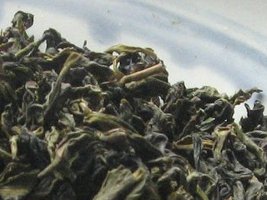Naturally Sweet Teas
Last Updated: Dec. 6, 2012
 High-quality pouchong tea is often naturally sweet and floral, almost as if one has added honey to it.
High-quality pouchong tea is often naturally sweet and floral, almost as if one has added honey to it.It is common for people to sweeten their tea, but as both sugar and artificial sweeteners can have negative impacts on health, people often seek out teas that are naturally sweeter, in order to avoid the need for sweetener.
Because sweetness is often seen as a desirable attribute, and because it is tricky to produce teas that have a naturally sweet flavor (as tea does not naturally contain any sugar), sweeter teas tend to be more expensive and in limited supply. But there are certainly exceptions to this rule in terms of inexpensive sweet teas, and there are also very high-quality, expensive, and limited supply teas that are bitter and not at all sweet.
Which types of tea are naturally sweetest?
Many white teas tend to be among the sweeter teas, but white teas are not always sweeter than other types of teas. Many oolong teas, especially greener oolongs such as pouchong and jade oolong, but also including many darker oolongs, can be naturally sweet. Some (not all) aged Pu-erh can be sweet; Pu-erh tends to mellow with age, losing many of the bitter flavors that are present in young Pu-erh, and often acquiring sweetness.Even black teas can be naturally sweet, including both lighter black teas such as Darjeeling first flush, earthy teas like Keemun, or teas such as Assam which are usually dark, powerful, and strongly bitter. Outside of reading others' reviews and trusting commercial descriptions from tea companies, the best way to locate naturally sweet teas is to sample them for yourself. It tends to be easier, however, to find naturally sweet teas among white teas and oolongs than among black teas.
Sweetening teas naturally without sugar:
There are numerous natural ways to sweeten tea by adding natural sugars, such as honey. However, it is trickier to find sugar-free (and thus calorie-free) sweeteners without resorting to synthetic artificial sweeteners. The most widely-known natural sweetener is stevia. Stevia is very intensely sweet, but has a particular flavor that not everyone likes and that does not blend well with all teas.Some spices and herbs, including cinnamon and licorice, have a sweet flavor. This flavor is more subtle than sugar, but it is definitely noticeable; adding cinnamon, licorice, or other naturally sweet herbs or spices to tea can add considerably sweetness.
Sweetness of herbal teas and flavored teas:
Just like with the tea plant, sweetness is rare and bitterness is common among herbal teas. However, herbal teas are such a broad category that it is easy to find naturally sweet, sugar-free herbal teas, especially ones containing natural sweeteners like stevia, naturally sweet herbs like anise hyssop, or sweet spices like cinnamon. Flavored teas combine the tea plant with herbs, spices, and other flavorings, and can also be more sweet even without adding any sugar.One of the herbal teas which is most naturally-sweet is Yerba mate; Yerba mate is incidentally one of the few herbal teas which contain caffeine. Yerba mate is available in both green and roasted forms, and both of which are naturally quite sweet, and considerably less bitter than tea, although like tea, both sweetness and bitterness varies considerably based on the individual source and how it is processed.


